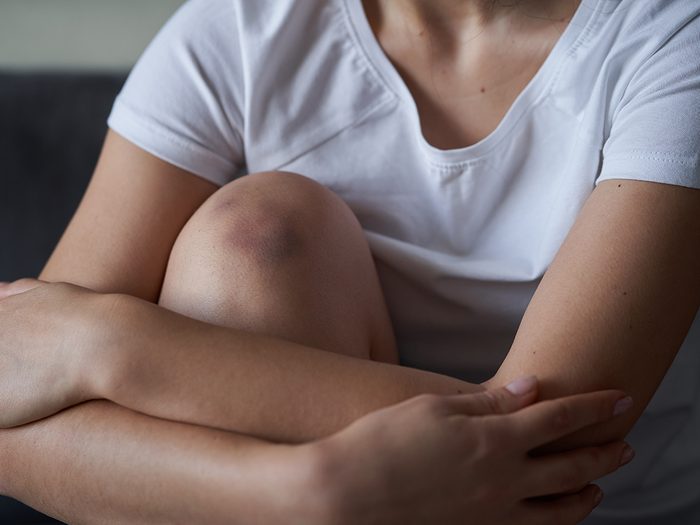
Bruising easily? It might be age
A lot of people notice, as they get older, that they tend to bruise more easily than they used to. If you’re among them, you needn’t necessarily worry. Known medically as “contusions,” bruises are usually caused by capillaries (small blood vessels) breaking and bleeding under your skin. With age, your capillaries naturally grow more fragile, and your skin and fat tissues get thinner and less effective at cushioning them against thumps and bumps.
At any stage of life, the vast majority of bruises are harmless and don’t require treatment: your body will reabsorb the spilled blood, usually within a few weeks. Placing an ice pack against a new contusion can reduce its spread, according to Dr. Paola Pasquali, a member of the European Academy of Dermatology and Venereology. “Once the bruise has been there for more than 48 hours, applying warm compresses can help speed healing,” she says.
If you keep spotting well-defined purple bruises in places where you’ve taken a lot of sun over the years, you may have actinic purpura, a condition that results from a combination of UV-ray damage and aging. But again, it’s benign. If you ever want to camouflage the bruising, Pasquali says, use whichever hue is complementary to it on the colour wheel. For instance, a green-tinted concealer followed by a skin-coloured one should do the trick for reddish-purple blemishes.

Other reasons you’re bruising easily
Getting older aside, some people just bruise more than others. A tendency to turn black and blue from minor injuries seems to run in some families, and as a general rule, women tend to be more susceptible than men. (Scientists are still exploring precisely why.)
For another possible explanation, look to your medications. “The long-term use of oral or topical corticosteroids [anti-inflammatories prescribed for arthritis, among other conditions] can cause the skin to thin, making it more prone to bruising,” says Pasquali. (Make sure you never mix these medications and supplements.)
Drugs that reduce blood clotting (such as Aspirin, warfarin and rivaroxaban) are also common culprits. They make it so that capillary bleeding takes longer to stop, resulting in bigger and more noticeable marks. This doesn’t automatically mean you should stop your prescription, particularly if you’re taking medication to control the risk of life-threatening events, such as heart attack or stroke.
Check out the medication mistakes that could make you sick.

When to consult your doctor about bruising
“Changing the dose or type of medication might be considered,” says Dr. Jecko Thachil, co-author of a 2017 British Medical Journal article about easy bruising in adults. “And the doctor should determine whether the medication is indeed causing the problem.” To this end, they might want to take a detailed medical history from you.
Although bruises are usually no cause for alarm, there are exceptions. If you have one that’s severely swollen and painful, rather than just mildly puffy and sore, your injury might be a sprain or fracture that requires attention. You should also talk with your family doctor if you suddenly get a lot of bruises, if they don’t fade away with time or if they keep showing up for no apparent reason—especially if it’s in less injury-prone areas, such as your back, torso or face. “They could be a sign of medical problems such as scurvy, leukemia, kidney disease or liver failure,” says Pasquali.
Now that you know the potential reasons you’re bruising easily, check out 20 symptoms you should never ignore.